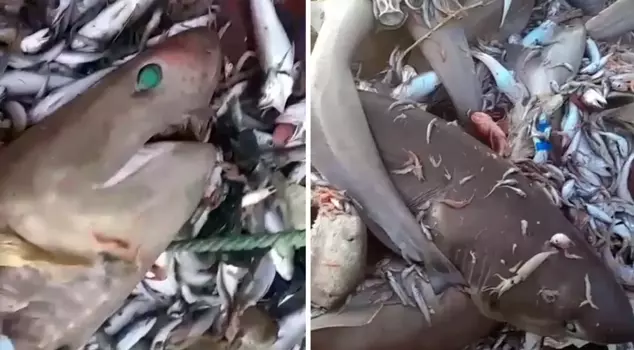
13.06.2025 18:23
Fishermen operating off the Mediterranean coast caught 8 protected bluntnose sixgill sharks. Research has shown that this species does not attack humans, while one of the fishermen who filmed the fish stated, "This year, no one should enter the Mediterranean; these will eat a person, let our enemies come in."
Eight sharks were caught in the nets of fishermen from Mersin in the Mediterranean, where there is no fishing ban. It was learned that the sharks are Hexanchus (bluntnose sixgill shark) and are a protected species.
"NO ONE SHOULD ENTER THE MEDITERRANEAN THIS YEAR"
Fishermen who went out to sea 15 miles off the coast of Silifke, Mersin, and fished with trawl nets caught 8 bluntnose sixgill sharks. The fishermen, surprised to see the sharks, recorded those moments with their mobile phones. One of the fishermen said, "No one should enter the Mediterranean this year, these will eat a person, let our enemies come in. Have you ever seen something like this in history? 8 of them," among other statements. It was learned that the fishermen released the sharks back into the sea.
HAS NOT BEEN REPORTED TO ATTACK HUMANS FOR YEARS
On the other hand, it was learned that the bluntnose sixgill shark lives in deep waters. Research has shown that this species of shark does not attack humans unless provoked. According to the International Shark Attack File, there has been only one recorded attack on a human by this species in hundreds of years, and that incident occurred as a result of the animal being provoked. It was noted that the bluntnose sixgill shark, which is under threat of extinction, does not come close to the shores.
2 SAND SHARKS CAUGHT ON A HOOK IN ONE NIGHT
The day before, two sharks had been caught on the hook of Durmuş Ali Kesikbaş, who was fishing amateurly from the shore in Taşucu, one of Mersin's important tourist areas. Kesikbaş's excited moments were captured on his mobile phone camera. 32-year-old Durmuş Ali Kesikbaş, who works as a tower crane operator, also released the two sand sharks, which are known not to attack humans, back into their natural habitat, the sea.